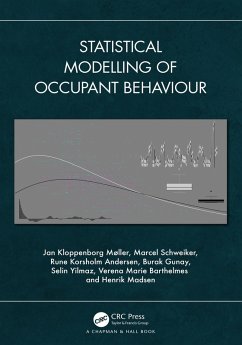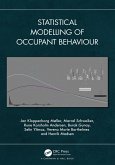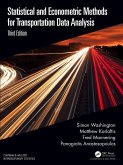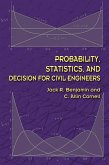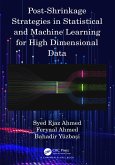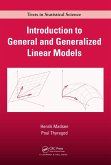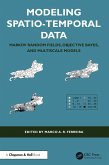Jan Kloppenborg Møller, Marcel Schweiker, Rune Korsholm Andersen, Burak Gunay, Selin Yilmaz, Verena Marie Barthelmes, Henrik Madsen
Statistical Modelling of Occupant Behaviour (eBook, ePUB)
52,95 €
52,95 €
inkl. MwSt.
Sofort per Download lieferbar

26 °P sammeln
52,95 €
Als Download kaufen

52,95 €
inkl. MwSt.
Sofort per Download lieferbar

26 °P sammeln
Jetzt verschenken
Alle Infos zum eBook verschenken
52,95 €
inkl. MwSt.
Sofort per Download lieferbar
Alle Infos zum eBook verschenken

26 °P sammeln
Jan Kloppenborg Møller, Marcel Schweiker, Rune Korsholm Andersen, Burak Gunay, Selin Yilmaz, Verena Marie Barthelmes, Henrik Madsen
Statistical Modelling of Occupant Behaviour (eBook, ePUB)
- Format: ePub
- Merkliste
- Auf die Merkliste
- Bewerten Bewerten
- Teilen
- Produkt teilen
- Produkterinnerung
- Produkterinnerung

Bitte loggen Sie sich zunächst in Ihr Kundenkonto ein oder registrieren Sie sich bei
bücher.de, um das eBook-Abo tolino select nutzen zu können.
Hier können Sie sich einloggen
Hier können Sie sich einloggen
Sie sind bereits eingeloggt. Klicken Sie auf 2. tolino select Abo, um fortzufahren.

Bitte loggen Sie sich zunächst in Ihr Kundenkonto ein oder registrieren Sie sich bei bücher.de, um das eBook-Abo tolino select nutzen zu können.
This book is the result of a collaboration between researchers from occupant behaviour and statistical modelling. It presents a range of statistical methods and models used for modelling occupancy behaviour.
- Geräte: eReader
- mit Kopierschutz
- eBook Hilfe
Andere Kunden interessierten sich auch für
![Statistical Modelling of Occupant Behaviour (eBook, PDF) Statistical Modelling of Occupant Behaviour (eBook, PDF)]() Jan Kloppenborg MøllerStatistical Modelling of Occupant Behaviour (eBook, PDF)52,95 €
Jan Kloppenborg MøllerStatistical Modelling of Occupant Behaviour (eBook, PDF)52,95 €![Statistical and Econometric Methods for Transportation Data Analysis (eBook, ePUB) Statistical and Econometric Methods for Transportation Data Analysis (eBook, ePUB)]() Simon WashingtonStatistical and Econometric Methods for Transportation Data Analysis (eBook, ePUB)121,95 €
Simon WashingtonStatistical and Econometric Methods for Transportation Data Analysis (eBook, ePUB)121,95 €![Probability, Statistics, and Decision for Civil Engineers (eBook, ePUB) Probability, Statistics, and Decision for Civil Engineers (eBook, ePUB)]() Jack R BenjaminProbability, Statistics, and Decision for Civil Engineers (eBook, ePUB)20,95 €
Jack R BenjaminProbability, Statistics, and Decision for Civil Engineers (eBook, ePUB)20,95 €![Post-Shrinkage Strategies in Statistical and Machine Learning for High Dimensional Data (eBook, ePUB) Post-Shrinkage Strategies in Statistical and Machine Learning for High Dimensional Data (eBook, ePUB)]() Syed Ejaz AhmedPost-Shrinkage Strategies in Statistical and Machine Learning for High Dimensional Data (eBook, ePUB)52,95 €
Syed Ejaz AhmedPost-Shrinkage Strategies in Statistical and Machine Learning for High Dimensional Data (eBook, ePUB)52,95 €![Introduction to General and Generalized Linear Models (eBook, ePUB) Introduction to General and Generalized Linear Models (eBook, ePUB)]() Henrik MadsenIntroduction to General and Generalized Linear Models (eBook, ePUB)46,95 €
Henrik MadsenIntroduction to General and Generalized Linear Models (eBook, ePUB)46,95 €![Modeling Spatio-Temporal Data (eBook, ePUB) Modeling Spatio-Temporal Data (eBook, ePUB)]() Modeling Spatio-Temporal Data (eBook, ePUB)52,95 €
Modeling Spatio-Temporal Data (eBook, ePUB)52,95 €![Spatio-Temporal Models for Ecologists (eBook, ePUB) Spatio-Temporal Models for Ecologists (eBook, ePUB)]() James ThorsonSpatio-Temporal Models for Ecologists (eBook, ePUB)86,95 €
James ThorsonSpatio-Temporal Models for Ecologists (eBook, ePUB)86,95 €-
-
-
This book is the result of a collaboration between researchers from occupant behaviour and statistical modelling. It presents a range of statistical methods and models used for modelling occupancy behaviour.
Dieser Download kann aus rechtlichen Gründen nur mit Rechnungsadresse in A, B, BG, CY, CZ, D, DK, EW, E, FIN, F, GR, HR, H, IRL, I, LT, L, LR, M, NL, PL, P, R, S, SLO, SK ausgeliefert werden.
Produktdetails
- Produktdetails
- Verlag: Taylor & Francis eBooks
- Seitenzahl: 382
- Erscheinungstermin: 26. Januar 2024
- Englisch
- ISBN-13: 9781003834977
- Artikelnr.: 69619378
- Verlag: Taylor & Francis eBooks
- Seitenzahl: 382
- Erscheinungstermin: 26. Januar 2024
- Englisch
- ISBN-13: 9781003834977
- Artikelnr.: 69619378
- Herstellerkennzeichnung Die Herstellerinformationen sind derzeit nicht verfügbar.
Jan Kloppenborg Møller, PhD, Engineering, is an associate professor in stochastic dynamical systems at the technical university of Denmark (DTU). He received a master of applied mathematics from DTU (2006), and a PhD in engineering from DTU (2011). His research is concentrated on modelling and forecasting of (continuous or discrete time) stochastic dynamical systems. He has been involved in projects and worked on many different systems such as: ecosystems, urban draniage, waste water treatment, wind and solar power forecast, and occupancy behavior. In all cases, focus has been on models that have a clear interpretation of states and parameters.
Møller has taught six different courses in statistics on levels ranging from bachelor to PhD-level. This includes a redesign of the introductory statistics courses at DTU, and the redesign of a second level course in statistics. His research concentrates on stochastic dynamical systems, using the appropriate tools and pushing advanced methods (like stochastic differential equation) towards application areas such as: wind power forecast, electricity load, and occupant behavior.
Marcel Schweiker is a full professor leading the Teaching and Research Area Healthy Living Spaces at the Institute for Occupational, Social and Environmental Medicine at University Hospital RWTH Aachen in Germany. He received a degree in Architecture from the University of Kassel in Germany, and spent four years at Tokyo City University in Japan, where he received a PhD in Environmental and Information Sciences in 2010. Until 2020, he was a researcher and lecturer at the Department of Architecture at the Karlsruhe Institute of Technology in Germany, and received from there, the postdoctoral lecture qualification (habilitation) in 2017. In parallel, between 2019 and 2020, he had a temporary professorship for Energy and Technology at the Faculty of Architecture, TU Kaiserslautern in Germany.
Schweiker's research and teaching surround several disciplines including: architecture, engineering, medicine, and psychology. His core interests are in improving our understanding of indoor environmental conditions promoting well-being and health within the built environment. He was in charge of building the LOBSTER, a unique facility for experimental studies, and is a sub-task leader in two international working groups under the umbrella of the International Energy Agency - Energy in Buildings and Communities program. He is a member of DIN/ISO standardization committees on ergonomics of the physical environment, published numerous research articles, and acquired project funding from local, sources such as Heidelberg Academy of Sciences and Humanities, national, DFG, BMBF, BMWK, and international, and the EU.
Rune Korsholm Andersen, PhD, is a senior researcher at the International Centre for Indoor Environment and Energy, Department of Environmental and Resource Engineering at the Technical University of Denmark (DTU). He received a Master of Science in Engineering (2005) from DTU, and a PhD in indoor environment and occupant behaviour (2009) from DTU.
His research focuses on understanding, modelling, and influencing the impact of occupants' behaviour on the indoor environment, and energy use in buildings. He uses long and short-term field measurements, questionnaire surveys, semi-structured interviews, building energy performance simulations, and chamber studies with human subjects, combined with statistical analysis and modelling, to gain insight into the understanding of the underlying reasons for observed behaviour patterns. He has published numerous research articles, and acquired research funding from Danish ministries, state financed research programs, private research foundations, and EU funding sources.
Burak Gunay, PhD, PEng is an Associate Professor in the Department of Civil and Environmental Engineering at Carleton University, Ottawa, Canada. He holds a B.A.Sc. degree in Civil Engineering from Bogazici University, Istanbul, Turkey (2009), an M.A.Sc. (2011), and Ph.D. (2016) in Civil Engineering from Carleton University, Ottawa, Canada. He is the recipient of multiple prestigious awards including seven best paper awards and Governor General's Gold Medal for his doctoral research. He is the principal investigator of the Datadriven Building Operation and Maintenance Laboratory. He has been affiliated with relevant professional organizations, and has held several leadership positions such as elected board member (2014-2024) and president (2022-2024) for the Canadian Chapter of the International Building Performance Simulation Association. He was a subtask
co-leader at the International Energy Agency's Energy in Buildings and Communities Programme's Annex 79 (2019-2023).
His research examines methods to optimize the operation of buildings for comfort, energy use, and demand flexibility. He uses operational data, gathered inside modern automation and control networks, to learn from the occupants' comfort, behaviour, and presence patterns. Using operational data, he employs inverse modelling to characterize building equipment operation and the envelope performance. Aside from field-scale data analyses, his research commonly uses building performance simulation.
Selin Yilmaz is a senior researcher and teaching fellow at the Chair for Energy Efficiency at University of Geneva. She is an experienced socio-technical researcher with extensive competencies in both theoretical and applied research in the field of energy, with a strong interest in environmental issues and sustainability transitions. She runs a research programme at the University Geneva with inter- and trans-disciplinary approaches. She focuses actively on methods such as participatory methods, co-design, and common governance methods as part of Living Labs ecosystems, working to improve conceptually and empirically sustainability experimentation, with the goal of tackling social change for sustainability, and developing understanding of transition phenomena in various contexts and fields of study.
She conducts forward-looking research with in-depth analyses of institutions and governance, and practices changes in energy transition experiments to explore the possibility of how these processes and practices can be improved and promoted to accelerate just andinclusive energy transition towards sustainability. She zooms in and zooms out into micro, macro processes to arrive at more holistic research strategies that offer more comprehensive, valid explanations for energy transformations.
Verena Marie Barthelmes, PhD, is System Engineering Project Manager for building automation control in large scale projects at Siemens Schweiz AG, Switzerland. After receiving an MSc in Architecture, she pursued her PhD in Energetics at the Energy Department (DENERG) of the Polytechnic University of Turin, Italy in close collaboration with the University of Cambridge, UK, and the Technical University of Denmark (DTU). Her doctoral studies revolved around occupant behaviour analysis and modelling, with specific focus on Bayesian network approaches, and survival analysis of national time-use survey data.
She was actively involved in European and national behavioural change programs, with the aim of defining ICT based tools and feedback strategies towards empowering individuals and communities to adopt energy-friendly, healthy practices. From 2019 to 2022, she was a Postdoctoral Researcher at the Éole Polytechnique Fédérale de Lausanne (EPFL), Switzerland. Key focus was the analyses of cause-effect relationships between the human building interaction, combined indoor environmental factors, and energy use in buildings based on a wide range of objective and subjective surveying methods. She is actively involved in national and international research projects surrounding the topics of human-building interaction and building automation control.
Henrik Madsen, in 1986, received a PhD in Statistics at the Technical University of Denmark (DTU). He was appointed Ass. Prof. in Statistics in 1986, Assoc. Prof. in 1989, and Professor in Mathematical Statistics with a special focus on Stochastic Dynamical Systems in 1999. In 2017, he was appointed Professor II at the Norwegian University of Science and Technology (NTNU) in Trondheim. His main research interest is analysis and modelling of stochastic dynamics systems. This includes: signal processing, time series analysis, identification, estimation, grey-box modelling, prediction, optimization, and control. The applications are mostly related to Energy Systems, Informatics, Environmental Systems, Bioinformatics, Biostatistics, Process Modelling, Finance, and Indoor Climate. He has received several awards. In June 2016, he was appointed Knight of the Order of Dannebrog by Her Majesty the Queen of Denmark, and in June 2017, was appointed Doctor HC at Lund University.
He has authored or co-authored approximately 650 papers and 12 books. The most recent books are: Time Series Analysis (2008), General and Generalised Linear Models (2011), Integrating Renewables in Electricity Markets (2013), and Statistics for Finance (2015).
Møller has taught six different courses in statistics on levels ranging from bachelor to PhD-level. This includes a redesign of the introductory statistics courses at DTU, and the redesign of a second level course in statistics. His research concentrates on stochastic dynamical systems, using the appropriate tools and pushing advanced methods (like stochastic differential equation) towards application areas such as: wind power forecast, electricity load, and occupant behavior.
Marcel Schweiker is a full professor leading the Teaching and Research Area Healthy Living Spaces at the Institute for Occupational, Social and Environmental Medicine at University Hospital RWTH Aachen in Germany. He received a degree in Architecture from the University of Kassel in Germany, and spent four years at Tokyo City University in Japan, where he received a PhD in Environmental and Information Sciences in 2010. Until 2020, he was a researcher and lecturer at the Department of Architecture at the Karlsruhe Institute of Technology in Germany, and received from there, the postdoctoral lecture qualification (habilitation) in 2017. In parallel, between 2019 and 2020, he had a temporary professorship for Energy and Technology at the Faculty of Architecture, TU Kaiserslautern in Germany.
Schweiker's research and teaching surround several disciplines including: architecture, engineering, medicine, and psychology. His core interests are in improving our understanding of indoor environmental conditions promoting well-being and health within the built environment. He was in charge of building the LOBSTER, a unique facility for experimental studies, and is a sub-task leader in two international working groups under the umbrella of the International Energy Agency - Energy in Buildings and Communities program. He is a member of DIN/ISO standardization committees on ergonomics of the physical environment, published numerous research articles, and acquired project funding from local, sources such as Heidelberg Academy of Sciences and Humanities, national, DFG, BMBF, BMWK, and international, and the EU.
Rune Korsholm Andersen, PhD, is a senior researcher at the International Centre for Indoor Environment and Energy, Department of Environmental and Resource Engineering at the Technical University of Denmark (DTU). He received a Master of Science in Engineering (2005) from DTU, and a PhD in indoor environment and occupant behaviour (2009) from DTU.
His research focuses on understanding, modelling, and influencing the impact of occupants' behaviour on the indoor environment, and energy use in buildings. He uses long and short-term field measurements, questionnaire surveys, semi-structured interviews, building energy performance simulations, and chamber studies with human subjects, combined with statistical analysis and modelling, to gain insight into the understanding of the underlying reasons for observed behaviour patterns. He has published numerous research articles, and acquired research funding from Danish ministries, state financed research programs, private research foundations, and EU funding sources.
Burak Gunay, PhD, PEng is an Associate Professor in the Department of Civil and Environmental Engineering at Carleton University, Ottawa, Canada. He holds a B.A.Sc. degree in Civil Engineering from Bogazici University, Istanbul, Turkey (2009), an M.A.Sc. (2011), and Ph.D. (2016) in Civil Engineering from Carleton University, Ottawa, Canada. He is the recipient of multiple prestigious awards including seven best paper awards and Governor General's Gold Medal for his doctoral research. He is the principal investigator of the Datadriven Building Operation and Maintenance Laboratory. He has been affiliated with relevant professional organizations, and has held several leadership positions such as elected board member (2014-2024) and president (2022-2024) for the Canadian Chapter of the International Building Performance Simulation Association. He was a subtask
co-leader at the International Energy Agency's Energy in Buildings and Communities Programme's Annex 79 (2019-2023).
His research examines methods to optimize the operation of buildings for comfort, energy use, and demand flexibility. He uses operational data, gathered inside modern automation and control networks, to learn from the occupants' comfort, behaviour, and presence patterns. Using operational data, he employs inverse modelling to characterize building equipment operation and the envelope performance. Aside from field-scale data analyses, his research commonly uses building performance simulation.
Selin Yilmaz is a senior researcher and teaching fellow at the Chair for Energy Efficiency at University of Geneva. She is an experienced socio-technical researcher with extensive competencies in both theoretical and applied research in the field of energy, with a strong interest in environmental issues and sustainability transitions. She runs a research programme at the University Geneva with inter- and trans-disciplinary approaches. She focuses actively on methods such as participatory methods, co-design, and common governance methods as part of Living Labs ecosystems, working to improve conceptually and empirically sustainability experimentation, with the goal of tackling social change for sustainability, and developing understanding of transition phenomena in various contexts and fields of study.
She conducts forward-looking research with in-depth analyses of institutions and governance, and practices changes in energy transition experiments to explore the possibility of how these processes and practices can be improved and promoted to accelerate just andinclusive energy transition towards sustainability. She zooms in and zooms out into micro, macro processes to arrive at more holistic research strategies that offer more comprehensive, valid explanations for energy transformations.
Verena Marie Barthelmes, PhD, is System Engineering Project Manager for building automation control in large scale projects at Siemens Schweiz AG, Switzerland. After receiving an MSc in Architecture, she pursued her PhD in Energetics at the Energy Department (DENERG) of the Polytechnic University of Turin, Italy in close collaboration with the University of Cambridge, UK, and the Technical University of Denmark (DTU). Her doctoral studies revolved around occupant behaviour analysis and modelling, with specific focus on Bayesian network approaches, and survival analysis of national time-use survey data.
She was actively involved in European and national behavioural change programs, with the aim of defining ICT based tools and feedback strategies towards empowering individuals and communities to adopt energy-friendly, healthy practices. From 2019 to 2022, she was a Postdoctoral Researcher at the Éole Polytechnique Fédérale de Lausanne (EPFL), Switzerland. Key focus was the analyses of cause-effect relationships between the human building interaction, combined indoor environmental factors, and energy use in buildings based on a wide range of objective and subjective surveying methods. She is actively involved in national and international research projects surrounding the topics of human-building interaction and building automation control.
Henrik Madsen, in 1986, received a PhD in Statistics at the Technical University of Denmark (DTU). He was appointed Ass. Prof. in Statistics in 1986, Assoc. Prof. in 1989, and Professor in Mathematical Statistics with a special focus on Stochastic Dynamical Systems in 1999. In 2017, he was appointed Professor II at the Norwegian University of Science and Technology (NTNU) in Trondheim. His main research interest is analysis and modelling of stochastic dynamics systems. This includes: signal processing, time series analysis, identification, estimation, grey-box modelling, prediction, optimization, and control. The applications are mostly related to Energy Systems, Informatics, Environmental Systems, Bioinformatics, Biostatistics, Process Modelling, Finance, and Indoor Climate. He has received several awards. In June 2016, he was appointed Knight of the Order of Dannebrog by Her Majesty the Queen of Denmark, and in June 2017, was appointed Doctor HC at Lund University.
He has authored or co-authored approximately 650 papers and 12 books. The most recent books are: Time Series Analysis (2008), General and Generalised Linear Models (2011), Integrating Renewables in Electricity Markets (2013), and Statistics for Finance (2015).
1. Introduction. 2. Likelihood. 3. General linear models. 4. Generalized linear models. 5. Linear mixed effects. Models. 6. Hierarchical models. 7. Survival Analysis. 8. Linear Time Series Models. 9. Markov chain models. 10. State Space Models. 11. Hidden Markov Models.
1. Introduction. 2. Likelihood. 3. General linear models. 4. Generalized linear models. 5. Linear mixed effects. Models. 6. Hierarchical models. 7. Survival Analysis. 8. Linear Time Series Models. 9. Markov chain models. 10. State Space Models. 11. Hidden Markov Models.
